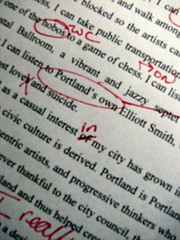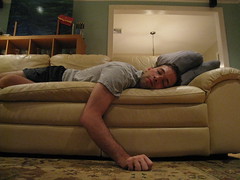Accepting that first drafts aren’t final drafts is a big milestone at the beginning of the journey to becoming a writer. The first couple things we write, we think that we have to—and will—get it perfect on the first pass through. It’s devastating to receive the news that our draft isn’t perfect—or even that good. It’s disheartening to think that what we thought needed a minor word-level edit actually needs a major character-and-plot-level overhaul.
But finally, we accept that our first drafts are just that—first drafts—and our writing is found in the rewriting of it. And for most of us, that means we don’t put quite as much effort into our first drafts, focusing more on getting the broad strokes down than getting the phraseology perfect.
 So when we’re drafting lazy, of necessity, we leave in some things that we know we’ll only end up taking out later—or we leave out some things that we know we can add later.
So when we’re drafting lazy, of necessity, we leave in some things that we know we’ll only end up taking out later—or we leave out some things that we know we can add later.
A few examples:
-
Leave in:
- clichés
- scene summaries (of scenes you do intend to show in real time)
- near-match words
- scenes that may or may not turn out to be tangents
- the boring bits
- Leave out:
- descriptions
- dialogue
- punctuation
- grammar check
- spell check
- voice (I think we may talk more about this later in the week)
What do you leave in or out of your first drafts?
Photo credit: Aaron Brown

